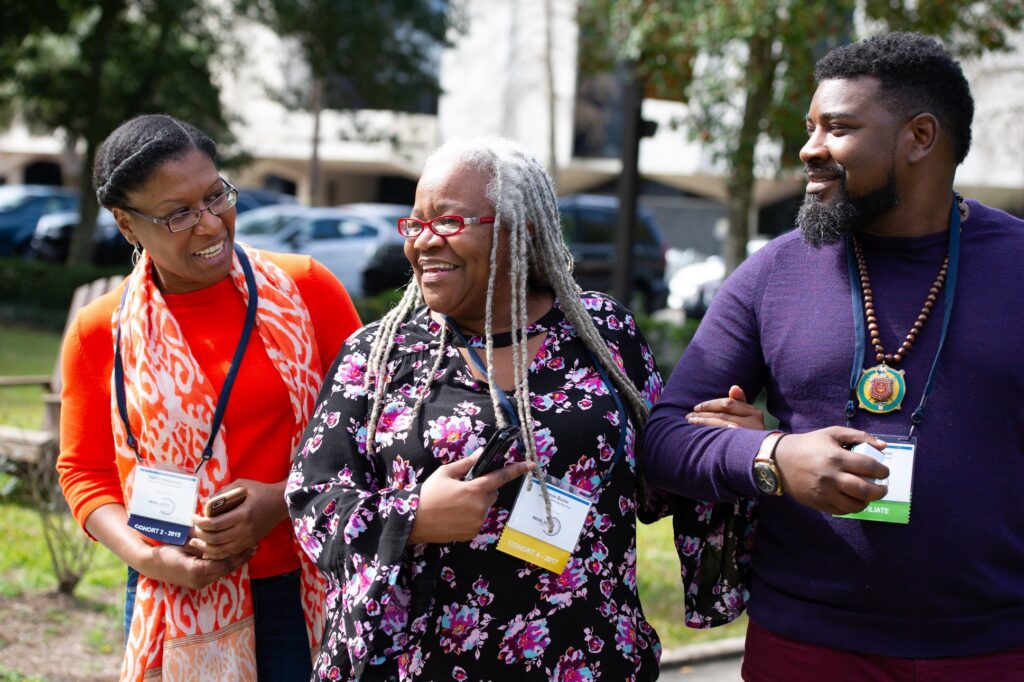The groundbreaking race equity work that RJI Fellows are doing at the local level is also being replicated state by state.
March 1, 2019

President Trump’s time at the helm of the federal government has been characterized by chaotic policy-making that has sparked fervent conversations, dominated news coverage, and triggered protests. At the same time, the Trump Administration has been moving to roll back federal guidance meant to address the racial discrimination that still remains in a country which passed the Civil Rights Act only 55 years ago. These efforts, though under-the-radar, are likely to have long-lasting repercussions for millions of people across America. Fortunately, communities of color and their advocates are not lying in wait while these regressive actions take place — they are moving full-speed ahead to advance racial justice at the state and local levels.
Equitable access to housing, education, and justice are central American values. But, because this country’s history of racial segregation has informed structural inequities that exist today, those ideals are not yet a lived reality for all. Decades after explicitly racist housing policies have been outlawed, the U.S. Department of Housing and Urban Development reports that discrimination persists against African-Americans searching for homes. Despite this, HUD Secretary Ben Carson plans to revise 2013 regulations governing the standard under which liability for race discrimination can be alleged under the Fair Housing Act. If HUD follows through on this plan, it would leave African-Americans and other people of color with insufficient legal grounds for redress when housing has been denied due to discrimination.
On the education front, just months after the federal government reportedthat black students face greater rates of suspension, expulsion, and arrest than their white classmates, the Department of Education rescinded guidance that directed schools to identify and track when disciplinary measures are disproportionately being meted out to students of color. The Department says that the guidance “sent the message that the federal government, rather than teachers and local administrators, best handles school discipline.” But, years after the Supreme Court’s landmark decision in Brown v. Board of Education, the Department’s actions ignore the role that institutions — and the individual actors who make them up — play in maintaining systemic inequities that keep black and brown students from getting an education equal to their white peers’.
Though the rollback of civil rights protections at the federal level is disheartening, advocates and the communities they serve are not standing still. Across the country, advocates for people living in poverty are working to ensure racial justice is a core part of their work. The Sargent Shriver National Center on Poverty Law, through its Racial Justice Institute(RJI), is arming lawyers with the tools to understand how systemic racism impacts their clients, and how they can better advocate for low-income people of color whose experiences with racism and poverty intersect in America.
Over the past six years, RJI has trained and supported over 200 advocates in 28 states and the District of Columbia. One of those advocates is John Petit, a Managing Attorney at Community Legal Aid Services who represented residents of a public housing complex in Canton, Ohio, who were being told to move immediately by the owner. “From a race equity lens it didn’t look right. This was in an area that was predominantly African American. Thirty-six out of 38 families in that housing complex were African-American.”
Using the tools and insight he gained from RJI, John and his colleagues were able to secure a relocation plan for the tenants and get the building owners to re-evaluate their policies. He particularly remembers an elderly resident who was denied housing because she had an eviction from 20 years ago and a low credit rating. “One of our attorneys reached out to that housing provider and asked them ‘Why is her credit so important? Why does this 20-year eviction matter? This is subsidized housing.’ And they changed their policies and let her in.”
The groundbreaking race equity work that RJI Fellows are doing at the local level is also being replicated state by state. Two other RJI Fellows, Candace Moore of the Chicago Lawyers’ Committee for Civil Rights and Jessica Schneider of Equip for Equality, mapped racial disparities in school discipline and worked with a community organization to better implement statewide discipline reform in Illinois. Advocates in Connecticut — also RJI Fellows — provided implicit bias training for school district officials and principals to address the disproportionate number of suspensions and expulsions for students of color in that state.
The challenges at the federal level may be daunting — and they warrant constant vigilance and opposition. That’s why it is critical that the Trump Administration’s creeping attacks on anti-discrimination protections do not go unnoticed or unanswered. Thankfully, national advocacy organizations, civil rights lawyers, and everyday individuals are keeping the pressure on and not letting these hard-won protections go without a fight.
But change doesn’t only happen in Washington D.C. In states across the country, advocates are on the ground advancing justice and opportunity for people whose experiences with poverty cannot be extricated from their experiences as people of color in America.Advancing justice and opportunity for all starts with understanding the explicit and implicit inequities that are baked into our society, laws, and institutions, and that influence the lives of people of color in America every day. With the support of RJI, advocates on-the-ground are doing just that, one state at a time.
Learn more about the Shriver Center’s Racial Justice Institute Program.
Ishena Robinson contributed to this blog post.